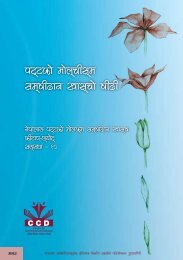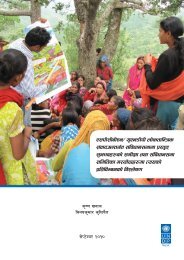English - Support to Participatory Constitution Building in Nepal ...
English - Support to Participatory Constitution Building in Nepal ...
English - Support to Participatory Constitution Building in Nepal ...
You also want an ePaper? Increase the reach of your titles
YUMPU automatically turns print PDFs into web optimized ePapers that Google loves.
The Remake of a Statestrengthen<strong>in</strong>g broader democratic process. The major concern <strong>in</strong> postconflictsocieties is ensur<strong>in</strong>g that the people engaged <strong>in</strong> violence will notresume such acts (Upreti 2006b).Re<strong>in</strong>tegration is a complex psychological, social, political and economicprocess. In this process, the demobilised soldiers or ex-combatants, theirfamilies and conflict victims start <strong>to</strong> live a civilian life as active membersof either their communities or new communities. In a conventional level,re<strong>in</strong>tegration is a process of assimilation of disarmed 3 and demobilised 4armed forces of warr<strong>in</strong>g parties and their families <strong>in</strong><strong>to</strong> the civilian socioeconomiclife. Re<strong>in</strong>tegration is all about accept<strong>in</strong>g ex-combatants and theirfamilies by host communities and develop<strong>in</strong>g a feel<strong>in</strong>g of co-existence.Former combatants and other conflict victims have <strong>to</strong> reconstruct theirlife styles, community relations and actively participate <strong>in</strong> civic life.Re<strong>in</strong>tegration is <strong>in</strong>evitably a lengthy and difficult process. 5 Hence, it isa complex and long-term economic, political, social and psychologicalprocess of transition of ex-soldiers from their military life <strong>to</strong> a civilian life,and of conflict victims from conflict-related stress <strong>to</strong> normal life (Aditya etal. 2006). Hence, political, social, economic and psychological re<strong>in</strong>tegrationis <strong>in</strong>evitable <strong>in</strong> successful reconciliation (Tutu 1999; Bloomfield et al.2003).Political re<strong>in</strong>tegration, for the purpose of this chapter, is def<strong>in</strong>ed asa process by which demobilised soldiers, conflict affected <strong>in</strong>dividualsand communities participate <strong>in</strong> structure and process of social andpolitical organisations <strong>in</strong> their communities and societies. The politicalparticipation of conflict affected people (IDPs, ex-combatants and otherconflict victims) is accepted and acknowledged by society <strong>in</strong> all socialand political structures and mechanisms and they could transform theirrelation <strong>to</strong> start normal civilian life.Social re<strong>in</strong>tegration, for the purpose of this chapter, is def<strong>in</strong>ed as a processof acceptance of former soldiers and their dependants, IDPs and conflict3Disarmament is a process of collection, control and disposal of weapons <strong>in</strong> the post-conflict peaceprocess.4Demobilisation is both a process and an outcome of releas<strong>in</strong>g troops from security service, therefore,a political process. The determ<strong>in</strong>ation of <strong>in</strong>dividuals <strong>to</strong> be demobilised and their discharge from serviceis a political decision. A demobilisation programme may <strong>in</strong>clude encampment of soldiers, rel<strong>in</strong>quish<strong>in</strong>gweapons and equipment; leavong a unit; exchang<strong>in</strong>g their uniform for civilian cloth<strong>in</strong>g; receiv<strong>in</strong>gidentification papers, medical attention, compensation, short tra<strong>in</strong><strong>in</strong>g courses and other forms ofassistance.5See Iqbal Riza, Assistant Secretary General for UN Peacekeep<strong>in</strong>g Operations, quoted <strong>in</strong> DemobilisedSoldiers Speak: Re<strong>in</strong>tegration and Reconciliation <strong>in</strong> Nicaragua, El Salvador and Mozambique, Managua,Nicaragua: Centro de Estudios Internacionales, 1995, p 4.261




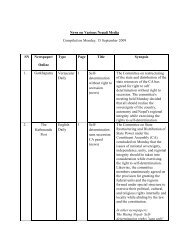
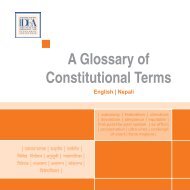
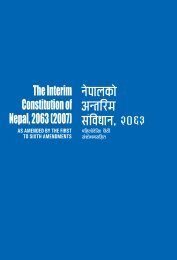
![g]k fnsf blntx? / gofF ;+l jwfg](https://img.yumpu.com/49483602/1/184x260/gk-fnsf-blntx-goff-l-jwfg.jpg?quality=85)
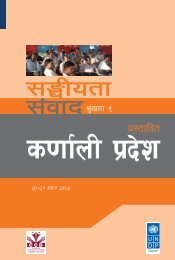
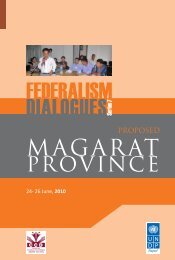
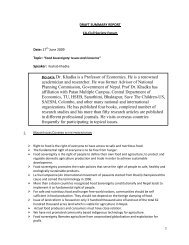
![+ljwfg;ef, /fHosf]k'g](https://img.yumpu.com/41604075/1/184x260/-ljwfgef-fhosfkg.jpg?quality=85)
